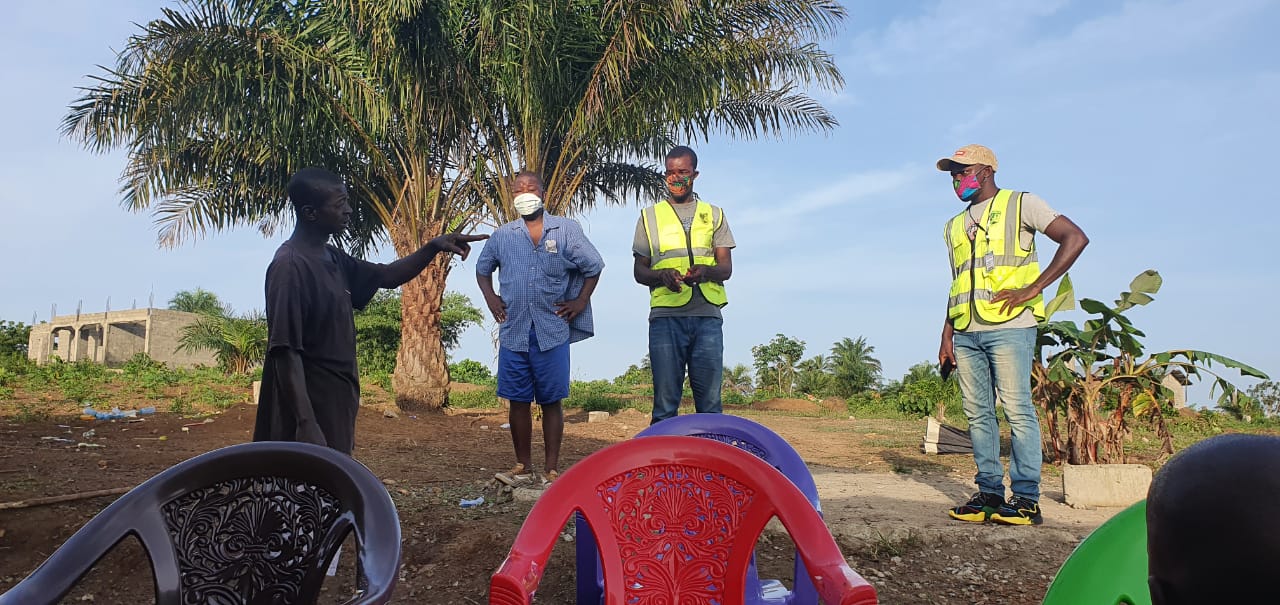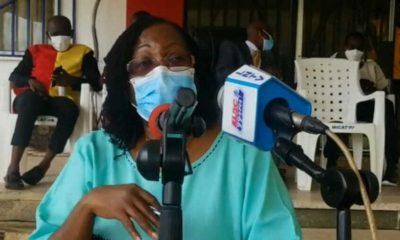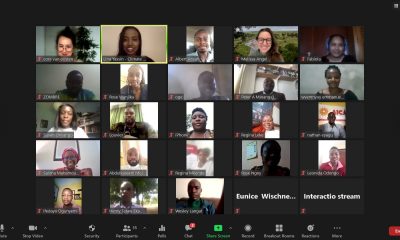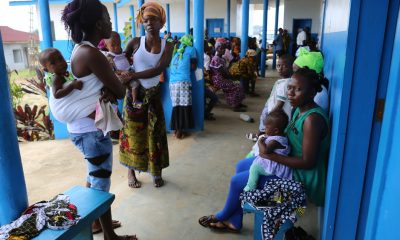
Caldwell – It has been almost four weeks since the death of an elderly man in the home of a controversial herbalist in Palm City, a new community in the township of Louisiana in the suburb of Monrovia.
Report By: Michael W. Gharib, Freelance (+231775553784 | michaelgharib@hotmail.com )
On April 29, residents here woke up to the unwelcomed news of the death of a 45-year- old man, who was undergoing traditional treatment at the residence of Joseph Giavogue. Guavogu, a native doctor, also goes by Joseph Seeba. Some say he is a native doctor, too. Apart from treating people of sicknesses, there are reports that he also works miracles for people – using leaves – to get rich, pregnant, win visas, etc.
Neither family members of the deceased nor the herbalist would say the cause of death or the specific sickness the deceased had before his demise.
So, community residents took step to know the cause of the death, calling on the government to intervene but to no avail.
Coronavirus Fear, A Resistant Community
Against a general decision by the community to disallow strangers to prevent COVID-19, the deceased was smuggled into the community to seek treatment.
“Our decision was simple. We will not allow any stranger in our community. All herbalists must stop treating people until this Coronavirus crisis is over; because we don’t know the kind of sicknesses they will be suffering from,” community acting chairman Ben S. Jah says.
Joseph did not attend the community meetings that reached the decision but was duly informed by the community leadership who met him shortly after the meeting.
Four days after the meeting, Joseph’s patient had died, leaving the community concerned since it was the first death in the community at the onset of COVID-19 in the country. Could it be related to Coronavirus? No one knew, and everyone opted for Science to determine the cause of death.
Endless, Futile Calls to Health Team
Several calls made to Montserrado County’s health team, using the emergency hotline 4455, did not yield any result.
“I made the first call on 4455. I spoke with them for close to five minutes. They promised to inform the relevant people to respond,” recalls Samuka V. Konneh, a resident of the community.
“After sometimes, I placed a follow-up call to confirm if my information was recorded.”
According to him, the phone emergency operators confirmed to him that his case has been recorded and forwarded to the right authority.
“The person I spoke with for the second time assured me that the health team was responding immediately,” he said.
While Konneh and the rest of the community leadership awaited the government’s health team to respond, they mobilized residents to prevent anyone from entering or exiting the residence of the herbalist.
The herbalist had no one to turn to because he had violated the community’s decision not to treat any sick persons. He was on his own. He was also afraid because he was informed that the government was coming in. There was a stalemate. Everyone was waiting and eager to see the government’s respond.
Powerless Contact Tracers Couldn’t Help
With suspicion that government may not respond in time, residents called people they thought had direct contact with the government.
Agents, mainly volunteers, of a private security guard agency, Secure Liberia Incorporated, also known as Kapao Kapao, moved in to secure the environment while they awaited officers of the Liberia National Police to arrive.
Contact tracers recruited by the Monrovia City Corporation were also called in. Supported by the Kapao Kapao agents, they quarantined the herbalist’s home. But this was only for a while.
Everyone was upbeat that government will send in the right team to do the right thing.

Native Doctor, Joseph Giavogue (with baby) being interviewed in the presence with brother and wife
The morning was early, cold, and foggy. Close to two hours waiting, they could not hang on anymore. Atop their impatience, it appeared their presence was useless as the national health team was nowhere to be found. Residents became concerned and worried that their efforts to support government had become futile.Relatives of the deceased insisted he did not die of COVID-19. But even in their insistence, they patiently waited for government as contact tracers would not let them take the corpse away.
One by one, contact tracers disappeared from the scene without a trace – leaving Palm City with their troubles to solve on their own.
“I was feeling sorry for them. I was ashamed for me. How will people take them serious next time if there is an incidence like this? Now, all of us feel so let down,” one resident said.
Inpatient Police Couldn’t Hold On
Even before the contact tracers disappeared, officers of the Liberian National Police were already long gone.
Residents said the police spent less than an hour here. Their presence gave a big boost to the community’s effort to support government ensure public health safety regulations. They were happy and hopeful; but this was short lived.
“Few police officers from the Samuka Town depot came in but left in just thirty minutes of arrival,” said Ben Jah. “We were shocked and confused when you noticed that the police had abandoned their posts.”
Community members were left with not options but to let go their dead body and take no further action.
There has been no new information about Joseph receiving new patients for herbal treatment.
“We saw a police officer standing at the main entrance of our community. We also noticed a group of young men from the community, the community engagement team, and few members of the Kapao Kapao team around the medicine man’s place. They have set up a barricade. I don’t know when they left because I was not here at the time,” said Pastor Ellis Alex Mulbah, a prominent member of the community.
Police Spokesman, H. Moses Carter, claimed the police officers may have left the scene earlier because of information available to them.
“Whatever the situation is that you are speaking of, I do not know the details of why the police left. But the police are not responsible to take off body from the street, in a normal situation,” Carter said to fend-off blames on the police.
“In a normal situation, it is the city policy through the city government that is responsible for that. The police probably left because of the information they received from the health team.”
Well, in the end, neither the health team nor the city police responded. The family took their deceased to a place only they can tell.
DBM Team Couldn’t Respond to Dead Body Alarm
To supplement the work of the national health response team, the Liberian government recently set up the Dead Body Management team. This team is managed by the Ministry of Internal Affairs. They are supposed to respond to situation like the one in Palm City.
But like the health team, the Dead Body Management team could not respond even after several calls.
Abraham Samukai Kromah is the director of communications at the Ministry of Internal Affair and an important member of the Dead Body Management Team, recently established to aid government’s COVID-19 response.
“We received a call from Palm City. I forwarded the information to one of the teams to be dispatched to there. We have four dead body response teams that are charged with the responsibilities to work within the seven health districts,” explains Kromah.
“Our team got to the scene late. Upon arrival, the body had already been taken away. So, we could not run a test. There is no reason why the team cannot respond. They may delay because the districts are large; and we do not have enough people to cover all the seven health districts.
“It is possible that the team has received two or three calls prior to your call. They will respond to your call, but it will take time because they have to respond to the previous calls. We have responded to over one hundred dead body cases, but not all of those cases are COVID-19 related.”
But Konneh, the community member who placed the call to the DBMT, thinks otherwise.
“If the dead body management team came, we did not see them. We kept observing that area for a long while. I placed the called. How did they find the place if I did not direct them?
“I did not get any return call. This is a new community. You can only identify a location if you’re directed by the very person who invited or by someone living there. Right now, we feel so confused. What do we next time there is a similar situation?”
No New Regulation for Herbalists / Country Doctors Amid COVID-19

A sign advertising Joseph’s herbal services in the Palm City community. He claims to be licensed by the Ministry of Internal Affairs
A black hand-written signboard is erected on the road leading to Joseph’s residence and shrine. The sign reads Ministry of Internal Affairs. However, there is absolutely no presence of the ministry in this community except the office of the Commissioner of Louisiana Township.
Residents say the signboard is a deception to lure patients of customers.
There is no evidence if Joseph holds a valid licence from the Ministry of Internal Affair as herbalist. It has been seven years since the government asked herbalists and native doctors to apply for operating licence.
Atop all these inconsistencies, there is even a bigger confusion. Liberia has not issued any new directive or clear-cut standard operating procedures to herbalists and native doctors amid a global pandemic.
“There has been no specific instruction given to herbalists or native doctors regarding how they should take care for sick persons and handle dead bodies. This is an issue of concern. We are going to work on it in the soonest possible time,” the MIA communications directors says.
Not a Single Contact Traced
Three weeks have passed since the death of the unknown man at Joesph’s shrine and no one from the government has returned to the community to double check.
Residents are showing pessimism about the health authorities’ commitment to supporting their community curb the spread of COVID-19. The incident involving Joseph and his dead patient echoes the disconnect.
Local Voices Liberia is a network of dedicated Liberian journalists based in the 15 counties working to lift the development concerns and progress of rural communities.


Methodology

True
The claim is rigorous and the content is demonstrably true.

Half True
The statement is correct, although it needs clarification additional information or context.

Unproven
Evidence publicly available neither proves nor disproves the claim. More research is needed.

Misleading
The statement contains correct data, but ignores very important elements or is mixed with incorrect data giving a different, inaccurate or false impression.

False
The claim is inaccurate according to the best evidence publicly available at this time.

Retraction
Upon further investigation of the claim, a different conclusion was determined leading to the removal of the initial determination.

Toxic
A rude, disrespectful, or unreasonable comment that is somewhat likely to make you leave a discussion or give up on sharing your perspective. Based on algorithmic detection of issues around toxicity, obscenity, threats, insults, and hate speech;
































































































































































































































































































































































































































































































































































































